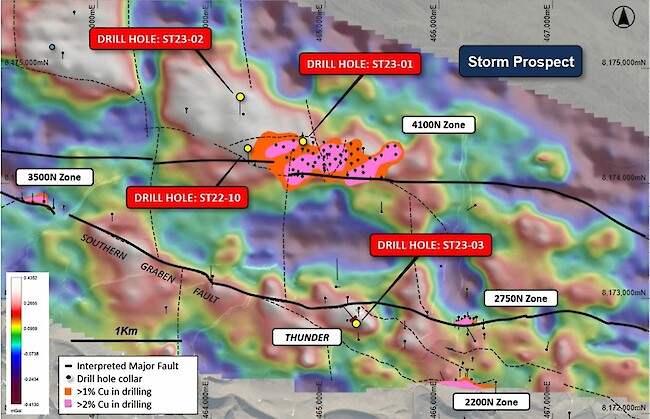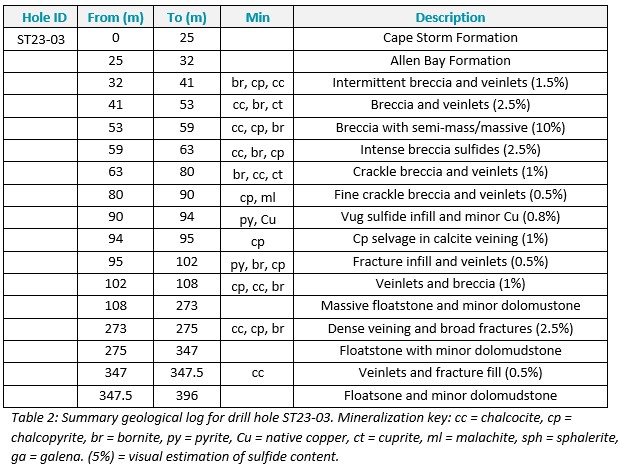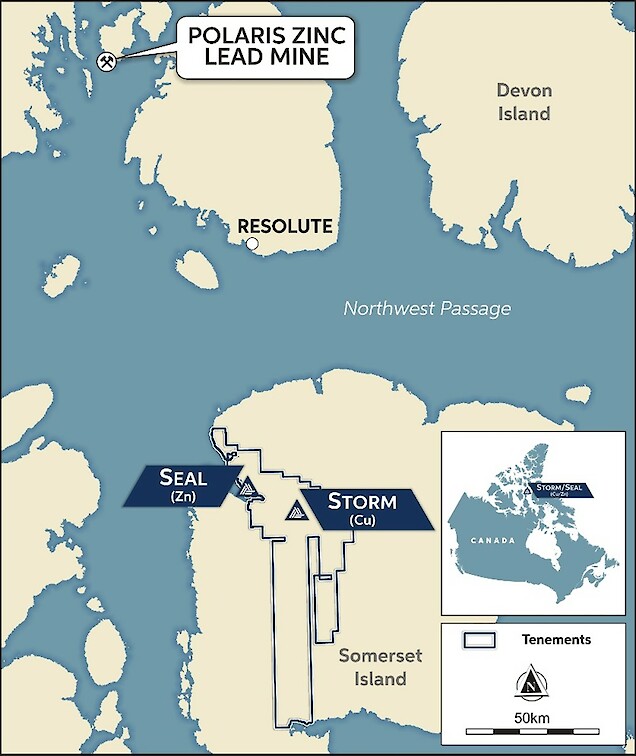News
Aston Bay and American West Metals Announce Two More Exceptional Discoveries at the Storm Copper Project, Canada
- Diamond drill hole ST23-03 has discovered a new near-surface zone of mineralization and a deeper sediment hosted copper system in an underexplored area of the Storm Project
- ST23-03 intersected two zones of visual copper sulfide mineralization:
- 76m of visual heavily mineralized breccia to massive copper sulfide (chalcocite, bornite and chalcopyrite) between 32m and 108m downhole
- 2m of visual breccia and dense vein style copper sulfide (chalcocite, bornite and chalcopyrite) between 273m and 275m downhole
- The new zone of near-surface copper has been named ‘Thunder’
- The deeper intersection is interpreted to correlate with the prospective sediment hosted copper horizon intersected earlier this season, and is the first recorded occurrence south of the Southern Graben Fault
- The drill hole was targeting both a near-surface Moving Loop Electromagnetic (MLEM) plate and a deeper gravity anomaly close to the Southern Graben Fault
- The drilling results confirm that these geophysical techniques are reliable targeting tools for copper sulfides at Storm
- Diamond drilling continues on high-priority copper targets
Aston Bay Holdings Ltd. (TSXV: BAY) (OTCQB: ATBHF) ("Aston Bay" or the "Company”) reports two new significant copper sulfide mineralization intercepts from a diamond drill hole testing blind geophysical targets at the Storm Copper Project (“Storm” or the “Project”) on Somerset Island, Nunavut, Canada. The program, still underway, is being conducted by American West Metals Limited (“American West”), who are the project operator since entering an option agreement with Aston Bay in March 2021.

Figure 1: Massive chalcocite (dark grey) and chalcopyrite (brassy) in drill hole ST23-03 from approximately 58m downhole.
“This discovery of a new, very thick, strongly mineralized intersection in the near-surface coupled with the intersection of a chalcocite-mineralized sediment hosted copper horizon at depth once again highlights the immense potential for new discoveries at Storm” stated Thomas Ullrich, CEO of Aston Bay.
“This booming intersection of massive copper sulfides and copper sulfide-filled breccias in the near-surface has been aptly named ‘Thunder.’ With clear similarities to the high-grade mineralization of the 2750N Zone located over 1km to the east, this zone points to the potential for additional high-grade near-surface resources to add to the delineation program currently underway.
“The deeper interval is the first intercept of chalcocite, bornite and chalcopyrite mineralization south of the Southern Graben Fault. This shows that metal-rich fluids are migrating along permeable horizons and precipitating high-copper content minerals on a large scale. This is just as the sediment hosted copper deposit model predicts and provides further evidence for the widespread nature of this much sought-after style of mineralization at Storm.
“As well, the ability of gravity geophysics to find hidden mineralization, suggested by the previous targeting success in discovery of a sediment hosted horizon at a similar depth to the north of the graben underlying and west of the 4100N Zone earlier this program, is now firmly established. We have sediment hosted copper mineralization at Storm, and we have a way to find it. Additional ground surveys along 10km of strike are being planned as a priority for next spring."

Figure 2: Plan view of the Storm area showing the gravity data interpretation, known copper deposit footprints (yellow),
major faults, and diamond drill hole locations as discussed in this release.
DIAMOND DRILLING HITS TWO NEW STRONG COPPER ZONES
Diamond drill hole ST23-03 has been completed in a largely untested area at the Storm Project and has intersected two main zones of visual copper sulfide mineralization. The drill hole is the third hole to be completed in the current drill program and was designed to test a high-priority, near-surface MLEM conductor, as well as a gravity anomaly proximal to the Southern Graben Fault at depth.
Both targets were successfully tested resulting in the discovery of two new zones of visual sulfide copper mineralization: a 76m intersection in the near surface corresponding to the MLEM conductor, and a deeper 2m intercept within the gravity anomaly. The drill hole highlights the outstanding exploration and expansion potential of both the near-surface, potentially open-pit accessible mineralization, and the deeper, large-scale sedimentary copper system.
The exceptional and thick upper copper sulfide mineralization within ST23-03 is more intense than the similar-looking, high-grade 2750N Zone mineralization (intersections include 41m @ 4.18% Cu within ST22-05), which is located over 1km to the east (Figures 2 & 3). The entire 76m interval in ST23-03 is heavily mineralized and includes a 22m thick zone of banded semi-massive to massive sulfides (Figures 1 & 4). The massive sulfides are interpreted to be the source of the MLEM anomaly. This geophysical method detects electrical conductance in high-sulfide content rock (typically >6% sulfide), which is typically contained within larger volumes of lower-sulfide, but still strongly mineralized, rock. Elsewhere at Storm, copper-rich massive sulfide bodies associated with MLEM anomalies are contained within larger bodies of breccia-fill and fracture-associated mineralization that contain greater than one percent copper.
The lower interval is interpreted to be the same distinctive sediment-hosted mineralized horizon as encountered within diamond drill holes ST22-10, ST23-01 and ST23-02 (Figures 2 & 3). Despite being relatively narrow (~2m), the presence of strong chalcocite, the mineral common in the core of these sediment hosted systems, is highly encouraging. Significantly, ST23-03 is the first deep drill hole to be drilled to the south of the Southern Graben Fault and is located over 1.7km from the other deeper drill holes (Figures 2 & 3). This discovery confirms the prospectivity of the area to the south of the main graben where multiple large gravity anomalies remain untested by drilling (Figure 3). Further diamond drilling is planned to test these features.

Figure 3: Total Bouguer gravity image of the Storm area, fault architecture and drill hole locations.

Visual estimates of mineral abundance should never be considered a proxy or substitute for laboratory analyses where concentrations or grades are the factor of principal economic interest. Laboratory assays are required to determine the presence and grade of any contained mineralization within the reported visual intersections of copper sulfides. Portable XRF is used as an aid in the determination of mineral type and abundance during the geological logging process.
DRILL HOLE ST23-03 DETAILS
ST23-03 was drilled to a downhole depth of 396m and intersected two main zones of visual copper mineralization. The drill hole was designed to test a near-surface MLEM conductor approximately 1km to the west of the high-grade copper 2750N Zone, and the edge of a moderately dense gravity anomaly close to the Southern Graben Fault (Figure 3). Corresponding upper and lower zones of copper sulfide mineralization were intercepted.
The upper zone of copper mineralization encountered within ST23-03 is a 76m thick interval of strong breccia and vein-style copper sulfides, with broad zones of semi-massive to massive sulfide from 32m downhole. The massive sulfides are dominantly chalcocite, with bornite and chalcopyrite (Figures 1 & 4), and represent a significant new discovery of near-surface copper mineralization.
The thickness and intensity of the mineralization of the new zone (now named ‘Thunder’), and high-grade 2750N and 2200N Zones along strike to the east, suggest that this high-grade mineralization and structural setting may be directly related to their proximity to the Southern Graben Fault. These faults are interpreted to be the primary source of plumbing for both the near-surface, and deeper copper mineralization.

Figure 4: Massive chalcocite (dark grey) in drill hole ST23-03 from approximately 57.4m downhole.
The lower zone of mineralization was intersected at 273m downhole and is interpreted to correlate with the sediment hosted copper mineralization intersected in drill holes ST22-10, ST23-01 and ST23-02. The 2m mineralized interval consists of broad fractures and dense anastomosing veins of chalcocite, bornite and chalcopyrite (Figure 5).
The copper sulfides are hosted within a sequence of organic rich and vuggy dolomudstones that are visually very similar to ST22-10, ST23-01 and ST23-02.

Figure 5: Breccia chalcocite (dark grey), bornite (purple/grey) and chalcopyrite (brassy) in drill hole ST23-03 from approximately 272.9m downhole.


Figure 6: NW – SE geological section through drill hole ST23-03.
PLANNED PROGRAM
- The diamond drilling is continuing to test key geophysical and geological copper targets in the Storm area.
- The Reserve Circulation (RC) drilling is continuing in the Storm area with the results from the 2750N and 2200N Zones expected shortly. Drilling will also focus on expansion of the 4100N Zone and testing new, near-surface copper targets.
- The ore sorting, beneficiation and process optimisation continues on a range of mineralization types.
- An environmental baseline survey will begin in mid-August 2023.
About the Storm Copper and Seal Zinc-Silver Projects, Nunavut
The Nunavut property consists of 173 contiguous mining claims covering an area of approximately 219,257 hectares on Somerset Island, Nunavut, Canada. The Storm Project comprises both the Storm Copper Project, a high-grade sediment-hosted copper discovery (intersections including 110m* @ 2.45% Cu from surface and 56.3m* @ 3.07% Cu from 12.2m) as well as the Seal Zinc Deposit (intersections including 14.4m* @ 10.58% Zn, 28.7g/t Ag from 51.8m and 22.3m* @ 23% Zn, 5.1g/t Ag from 101.5m). Additionally, there are numerous underexplored and undrilled targets within the 120-kilometre strike length of the mineralized trend, including the Tornado copper prospect where 10 grab samples yielded >1% Cu up to 32% Cu in gossans.
Storm Discovery and Historical Work
High-grade copper mineralization was discovered at Storm in the mid-1990s by Cominco geologists conducting regional zinc exploration around their then-producing Polaris lead-zinc mine. A massive chalcocite boulder found in a tributary of the Aston River in 1996 was traced to impressive surface exposures of broken chalcocite mineralization for hundreds of metres of surface strike length at what became named the 2750N, 2200N, and 3500N Zones. Subsequent seasons of prospecting, geophysics and over 9,000 m of drilling into the early 2000s confirmed a significant amount of copper mineralization below the surface exposures as well as making the blind discovery of the 4100N Zone, a large area of copper mineralization with no surface exposure.
Following the merger of Cominco with Teck in 2001 and the closure of the Polaris Mine, the Storm claims were allowed to lapse in 2007. Commander Resources staked the property in 2008 and flew a helicopter-borne VTEM survey in 2011 but conducted no additional drilling. Aston Bay subsequently entered into an earn-in agreement with Commander and consolidated 100% ownership in 2015. Commander retains a 0.875% Gross Overriding Royalty in the area of the original Storm claims.
In 2016 Aston Bay entered into an earn-in agreement with BHP, who conducted a 2,000-station soil sampling program and drilled 1,951m of core in 12 diamond drill holes, yielding up to 16m* @ 3.1% Cu. BHP exited the agreement in 2017. Aston Bay conducted a property-wide airborne gravity gradiometry survey in 2017 and drilled 2,913m in nine core holes in the Storm area in 2018 yielding a best intercept of 1.5m* @ 4.39% Cu and 20.5m* @ 0.56% Cu.
Agreement with American West Metals
An earn-in agreement for the Storm and Seal properties was signed with American West Metals in March 2021. Under the terms of the agreement, an expenditure of C$10m will earn 80% ownership of the property for American West. Aston Bay is carried for all expenditures to the completion of a feasibility study and production decision. If Aston Bay chooses not to participate and is diluted below 10% ownership, the ownership converts to a 2% Net Smelter Royalty, half of which is purchasable by American West for C$5m at first production. Aston Bay received a cash payment of C$500,000 on signing.
Recent Work
American West completed a fixed loop electromagnetic (FLEM) ground geophysical survey in 2021 that yielded several new subsurface conductive anomalies. A total of 1,534m were drilled in 10 diamond drill holes in the 2022 season, yielding several impressive near-surface intercepts including 41m* @ 4.1% Cu as well as 68m of sulfide mineralization associated with a deeper conductive anomaly.
In April 2022 results of beneficiation studies demonstrated that a mineralized intercept grading 4% Cu from the 4100N area could be upgraded to a 54% Cu direct ship product using standard sorting technology. Further beneficiation studies are ongoing.
In April 2023 American West embarked on a spring delineation drilling program using a helicopter-portable reverse circulation (RC) drill rig as well as gravity and moving loop electromagnetic (MLEM) ground geophysical programs. Results from the programs are in process and are released as they come available.
A summer 2023 program plans further delineation drilling of the near-surface high-grade copper zones to advance them toward maiden resource reports by late 2023. Diamond drilling is planned to test new high-priority gravity targets and environmental baseline studies will be initiated.
*Stated drill hole intersections are all core length, and true width is expected to be 60% to 95% of core length.

Figure 7: Storm Copper Project, Location Map.
Qualified Person
Michael Dufresne, M.Sc., P.Geol., P.Geo., is a qualified person as defined by National Instrument 43-101 and has reviewed and approved the scientific and technical information in this press release.
About Aston Bay Holdings
Aston Bay is a publicly traded mineral exploration company exploring for high-grade copper and gold deposits in Virginia, USA, and Nunavut, Canada. The Company is led by CEO Thomas Ullrich with exploration in Virginia directed by the Company's advisor, Don Taylor, the 2018 Thayer Lindsley Award winner for his discovery of the Taylor Pb-Zn-Ag Deposit in Arizona. The Company is currently exploring the high-grade Buckingham Gold Vein in central Virginia and is in advanced stages of negotiation on other lands with high-grade copper potential in the area.
The Company is 100% owner of the Storm Project property, which hosts the Storm Copper Project and the Seal Zinc Deposit and has been optioned to American West Metals Limited.
About American West Metals Limited
AMERICAN WEST METALS LIMITED (ASX: AW1) is an Australian clean energy mining company focused on growth through the discovery and development of major base metal mineral deposits in Tier 1 jurisdictions of North America. Our strategy is focused on developing mines that have a low-footprint and support the global energy transformation. Our portfolio of copper and zinc projects in Utah and Canada include significant existing resource inventories and high-grade mineralization that can generate robust mining proposals. Core to our approach is our commitment to the ethical extraction and processing of minerals and making a meaningful contribution to the communities where our projects are located.
Led by a highly experienced leadership team, our strategic initiatives lay the foundation for a sustainable business which aims to deliver high-multiplier returns on shareholder investment and economic benefits to all stakeholders.
For further information on American West, visit: www.americanwestmetals.com.
FORWARD-LOOKING STATEMENTS
Statements made in this news release, including those regarding the Option Agreement, grant of the Option and the expected closing date, American West’s interest in the Storm Project and its other acquisitions and plans, plans for the upcoming field season, management objectives, forecasts, estimates, expectations, or predictions of the future may constitute “forward-looking statement”, which can be identified by the use of conditional or future tenses or by the use of such verbs as “believe”, “expect”, “may”, “will”, “should”, “estimate”, “anticipate”, “project”, “plan”, and words of similar import, including variations thereof and negative forms. This press release contains forward-looking statements that reflect, as of the date of this press release, Aston Bay’s expectations, estimates and projections about its operations, the mining industry and the economic environment in which it operates. Statements in this press release that are not supported by historical fact are forward-looking statements, meaning they involve risk, uncertainty and other factors that could cause actual results to differ materially from those expressed or implied by such forward-looking statements. Although Aston Bay believes that the assumptions inherent in the forward-looking statements are reasonable, undue reliance should not be placed on these statements, which apply only at the time of writing of this press release. Aston Bay disclaims any intention or obligation to update or revise any forward-looking statement, whether as a result of new information, future events or otherwise, except to the extent required by securities legislation.
For more information contact:
Thomas Ullrich, Chief Executive Officer
thomas.ullrich@astonbayholdings.com
(416) 456-3516
Sofia Harquail, IR and Corporate Development
sofia.harquail@astonbayholdings.com
(647) 821-1337